Oppose All U.S. Aggression
• Denounce Obama's Use of Drones in Libya
• Civilian Casualties Continue in Libya Under Stepped Up NATO Bombings
•
Libyan Government Accepts African Union’s Peace Plan
Support Resistance
• Egyptians Remain Steadfast in Demands for Change
• Yemen Government Continues Violent Repression of Protesters
• Massive Protest Against U.S. Drone Strikes
• U.S. Condemned for Support of Violent State Repression in Bahrain
Denounce Obama's Use of Drones in Libya
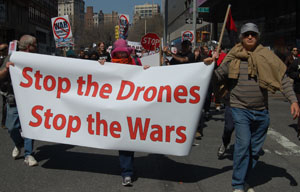 Voice of Revolution denounces the use of military predator drones for bombing of the Libyan people. U.S. Secretary of Defense Robert Gates said President Barack Obama has approved use of the deadly drones. “President Obama has said that where we have some unique capabilities, he is willing to use those,” adding “And in fact he has approved the use of armed Predators.” These drones are notorious for their use in massacring thousands of civilians in Pakistan. Obama has greatly increased their use since coming to office in Pakistan, Afghanistan, Yemen and now is using them against Libya. The drones will undoubtedly serve to kill more civilians and increase the violence on the ground, especially in urban areas.
Voice of Revolution denounces the use of military predator drones for bombing of the Libyan people. U.S. Secretary of Defense Robert Gates said President Barack Obama has approved use of the deadly drones. “President Obama has said that where we have some unique capabilities, he is willing to use those,” adding “And in fact he has approved the use of armed Predators.” These drones are notorious for their use in massacring thousands of civilians in Pakistan. Obama has greatly increased their use since coming to office in Pakistan, Afghanistan, Yemen and now is using them against Libya. The drones will undoubtedly serve to kill more civilians and increase the violence on the ground, especially in urban areas.
Their use is further indication of the U.S. elimination of international rule of law, as their use is commonly done against the sovereignty of the country involved and on the basis of CIA and other Special Forces Black (illegal) operations. They are also a means to try an win public support by lessening U.S. casualties, while trying to make "normal" the killing of civilians.
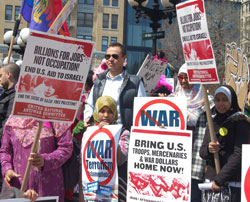 The drones, each equipped with multiple Hellfire missiles capable of intense destruction, are meant also meant to spread terror amongst the people of the targeted country and weaken the resistance. The U.S. openly promotes the killing of civilians using drones. Voice of America, an organ of the U.S. government, routinely reports on the "success" of predator drones in killing people. April 22, VOA boasted, "U.S. drones fired at least five missiles at a house in a tribal region (of Pakistan) near the Afghan border, killing 25 people... At least two women and three children are believed to be among the casualties." Such reporting is calculated to spread terror and the understanding that the U.S. military has no compunction in killing people indiscriminately if it serves its interests in expanding the U.S. Empire.
The drones, each equipped with multiple Hellfire missiles capable of intense destruction, are meant also meant to spread terror amongst the people of the targeted country and weaken the resistance. The U.S. openly promotes the killing of civilians using drones. Voice of America, an organ of the U.S. government, routinely reports on the "success" of predator drones in killing people. April 22, VOA boasted, "U.S. drones fired at least five missiles at a house in a tribal region (of Pakistan) near the Afghan border, killing 25 people... At least two women and three children are believed to be among the casualties." Such reporting is calculated to spread terror and the understanding that the U.S. military has no compunction in killing people indiscriminately if it serves its interests in expanding the U.S. Empire.
The State Department also confirmed that the U.S. will sent $25 million in aid to the so-called rebel fighters, through both the State Department and the Pentagon. Secretary of State Hillary Clinton called for the aid but the Pentagon will provide most of the supplies. This includes equipment such as body armor, radios, medical supplies, food and other items for the “rebel” forces.
Arming the rebels and using missiles and drones violates the arms embargo put in place by the UN. In this manner, the reality that U.S. aid is serving one side in the civil war, and not “humanitarian” purposes, is clear. The aim is to secure a government that serves U.S. interests.
Use of drones instead of troops also shows the difficulty the U.S. faces in conducting yet another war. Broad opposition continues to be expressed by Americans, demanding not aid and drones but All U.S. Troops Home Now. The Pentagon has already spent at least $608 million on military activities in Libya. At the current rate, the Pentagon is poised to spend approximately $40 million per month on Libya alone. This includes almost 200 Tomahawk missiles at the start of the aggression against Libya and continuing bombing runs by U.S. aircraft and now drones.
Voice of Revolution condemns the use of drones in Libya and elsewhere and demands an end to all U.S. aggression. We reject this effort by the U.S. to again use U.S. state terrorism to repress just resistance to U.S. aggression at home and abroad. And no one should doubt that the increased use of drones inside the U.S., at the borders and increasingly by police departments nationwide, will also serve to terrorize and target the people standing up for rights. We demand an end to use of all drones and an end to use of force in settling conflicts among nations.
[TOP]
Civilian Casualties Continue in Libya Under Stepped Up NATO Bombings
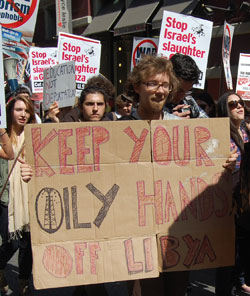 News agencies report that the U.S.-led NATO alliance has stepped up its bombing of the Libyan capital Tripoli and other parts of the country. While the main fighting of the civil war is in the east, NATO is increasing its bombings in the west, specifically in and around Tripoli. NATO officials undertook a new phase in operations April 19 with “deliberate, multiple strikes” by British aircraft on communications infrastructure and the headquarters of Libya’s 32nd Brigade located six miles south of Tripoli, it is reported. These attacks are ostensibly under the auspices of UN Security Council Resolution 1973, which states that the aim of the military mission is to enforce a no-fly zone for purposes of protecting civilians.
News agencies report that the U.S.-led NATO alliance has stepped up its bombing of the Libyan capital Tripoli and other parts of the country. While the main fighting of the civil war is in the east, NATO is increasing its bombings in the west, specifically in and around Tripoli. NATO officials undertook a new phase in operations April 19 with “deliberate, multiple strikes” by British aircraft on communications infrastructure and the headquarters of Libya’s 32nd Brigade located six miles south of Tripoli, it is reported. These attacks are ostensibly under the auspices of UN Security Council Resolution 1973, which states that the aim of the military mission is to enforce a no-fly zone for purposes of protecting civilians.
Libyan state television reported seven civilian deaths as a result of the attacks on Tripoli that were aimed at civilian and military targets and which destroyed several houses. In addition, the Libyan state information agency JANA said NATO planes attacked the town of Bir al-Ghanam to the south of Tripoli, killing four more civilians there.
Brigadier-General Mark van Uhm, NATO’s chief of allied operations, claimed the attacks on Tripoli, which is outside the major combat zones, were justified, saying “What we are doing is attacking the regime’s ability to supply and sustain [its] attacks [...] across the country.”
Uhm also said that NATO aircraft had destroyed significant numbers of tanks, armored vehicles and rocket launchers besieging the Libyan city of Misurata, 120 miles east of Tripoli on April 18.
Reports cite NATO sources saying the number of NATO airstrikes have doubled over the last two weeks, including bombing Tripoli April 14. Al-Arabiya reported that loud explosions rocked the Bab al-Aziziya neighborhood, where Libyan leader Muammar Qaddafi’s residence is located and also where most foreign journalists in the capital are based. NATO initially denied it had again bombed Tripoli, but an alliance spokesman later acknowledged that raids had targeted the outskirts, agencies report.
Michel Chossodovsky, writing for Global Research, provides information on the overall scope of the NATO military intervention:
“NATO data confirms the magnitude and destructive nature of the Libya military operation. According to the NATO website, ‘Since the beginning of the NATO operation a total of 2,771 sorties and 1,110 strike sorties have been conducted. A total of 18 ships under NATO command are actively patrolling the Central Mediterranean. 22 Vessels were hailed on 17 April to determine destination and cargo. 1 boarding was conducted (no diversion). A total of 384 vessels have been hailed, 10 boardings and 3 diversions have been conducted since the beginning of arms embargo operations.’ [NATO website]
“The above number of sorties includes only those tabulated since NATO took command of Operation Odyssey Dawn. It does not include the sorties between March 19 and March 30.
“The coalition is currently running more than a hundred sorties a day.
“We are dealing with a formidable military force, a deployment of naval power and air force bombers directed against a country of less than 7 million people, less than the population of Switzerland.
“Let us be under no illusions. There is evidence of mass civilian casualties. These are war crimes (using advanced weapons systems) directed against a defenseless population.”
Libyan “Rebels” Confirm Arms Supplies from Abroad
In addition to recently approved aid from the U.S., the Libyan “rebels” confirmed on April 17 that they are receiving arms from abroad. Abdel Fattah Yunes, military chief of the Transitional National Council headquartered in Benghazi said that supplies of war material to fight government troops are in transit from “friendly” nations, although he declined to reveal which country the arsenals are coming from, a Saudi Arabian satellite channel reported. Yunes noted that most of his men are using bulletproof vests made in Britain and cell phones and other communication equipment of similar provenance.
On April 20 Libya warned Britain that it would be futile to send military advisers to Benghazi with the alleged interest of helping the armed rebellion to become organized, describing it as “an impossible mission,” Prensa Latina reports. According to British Foreign Minister William Hague, his country will send up to 20 military advisers to Benghazi, Libya’s second-largest city, which has become the capital of the opposition which has been fighting against the government of Muammar Qaddafi since February 15.
Deputy Foreign Minister Khled Kaim said the decision announced by Britain exceeded the mandate granted by the UN Security Council Resolution, already criticized by Libya, which imposed a no-fly zone but excluded a land occupation. “This is an impossible mission. Organize who? They [the so-called rebels] are different groups; there is no leader; they are not well-organized, and I am sure it will be a failure,” Kaim said in a conference press broadcast by state-run Al Jamahiriya television.
The British military advisers will join a group of British diplomats who are already conspiring with the Transitional National Council there, advising them on how to improve their military organization and communications.
In related news, at the Contact Group on Libya meeting held on April 13 in Doha, Qatar, the matter of whether the international community could provide the rebel army with arms for counter attacking government troops or for self-defense was part of the discussion. Italy was in favor of the suggestion, but received only a few positive responses, agencies report. Given that NATO’s mission should be in accordance with UN Security Council Resolution 1973, which requests an arms embargo on Libya, sending weapons to rebels would violate the resolution, Xinhua notes.
With the increasing reports of foreign countries and possibly NATO members arming the so-called rebels, NATO Secretary General Anders Fogh Rasmussen covered up that the warmongering UN Security Council resolution had been “violated.” At a meeting of NATO foreign ministers last week, he claimed he received no request to amend the resolution. “As regards to arms, we have been mandated by the UN Security Council to enforce an arms embargo and we will do so in strict conformity,” he said.
NATO Meeting in Berlin
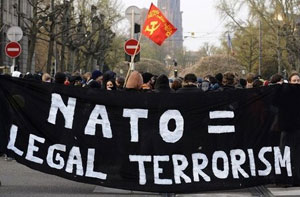 In other related news, foreign ministers of the U.S.-led NATO alliance held two days of meetings in Berlin. The meetings ended with mixed outcomes on April 15, combined with vows of unity and signs of division over scope of the NATO military campaign in Libya, Xinhua reports.
In other related news, foreign ministers of the U.S.-led NATO alliance held two days of meetings in Berlin. The meetings ended with mixed outcomes on April 15, combined with vows of unity and signs of division over scope of the NATO military campaign in Libya, Xinhua reports.
In press conferences during the meeting, NATO Secretary General Rasmussen continually claimed that NATO is strictly implementing UN Security Council Resolution 1973 “both in letter and in spirit,” and taking responsibility for protecting civilians in Libya from attacks with “all necessary measures,” just as the resolution requires.
Despite its illegal participation in a civil war and plans for regime change, Rasmussen repeated the pretence that NATO has not and will not interfere in the Libyan people’s political process.
Rasmussen further strained credulity by placing a condition on NATO’s continued “non-interference,” namely the departure of Qaddafi. “NATO is absolutely determined to continue its operation for as long as there is a threat against Libyan civilians and it is impossible to imagine that threat disappearing with Qaddafi. in power,” Rasmussen said in the closing press conference.
Thus, NATO endorsed the outcome of the first meeting of the Contact Group on Libya held on April 13, which called for Qaddafi. to leave power.
In a joint statement, the foreign ministers outlined three objectives of NATO’s military operation in Libya: the end to all attacks and threat of attacks against civilians, the withdrawal of all Qaddafi’s forces to bases, and immediate humanitarian access. However, the Berlin meeting failed to offer a clear answer as to how to achieve them, as rifts remained among the powers with different considerations of interests, Xinhua notes.
Only six out of NATO’s 28 members are conducting airstrikes, while the U.S. claims to have stepped back after putting a Canadian lieutenant general as its proxy in charge of the mission in Libya.
U.S. Secretary of State Hillary Clinton stressed that the NATO members are “sharing the same goal” and “contributing in many ways to see that goal realized,” avoiding discussion on new pledges and downplaying divisions within the alliance, agencies report. “As our mission continues, maintaining our resolve and unity only grows more important,” she added.
Reports also say calls for more contributions from other countries were repeated throughout the Berlin meeting. Although Rasmussen said he was confident that the alliance would “step up to the plate,” the NATO chief did not announce any specific pledges or promises during the two-day meeting, simply saying that he “heard indications that gave me hope.”
Xinhua reports that even before the meeting, signs of discord emerged as France and Britain impatiently pressed their allies to make more robust contributions because three weeks of airstrikes failed to help the “rebels” gain the upper hand in the battle field against government troops. A French official said earlier that Italy, Spain, the Netherlands and Sweden should do more for the joint mission. But Spain’s government responded that it had no plan to take part in any air strikes, reports say. Many countries, such as Italy, have put restrictions on the use of their planes, it is also reported.
“Analysts said that in coming months, NATO’s resolve and coordination capability would be put to a serious test as the two conflicting sides in Libya came into a seesaw battle, with Qaddafi’s force controlling the west and rebels the east,” Xinhua writes.
Answering questions of German magazine Der Spiegel, Rasmussen glibly ignored the tragic human cost NATO’s airstrikes are having on Libya, its people and infrastructure, claiming only that “the worst outcome would be a military stalemate or a de facto partition of Libyan society, in which Libya would become a failed state and a breeding ground for terrorist groups — and that so close to Europe’s borders.”
[TOP]
Libyan Government Accepts African Union’s Peace Plan
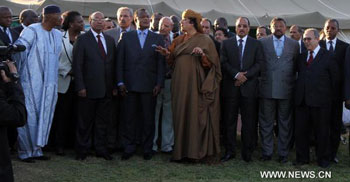 Libyan leader Muammar Qaddafi accepted the African Union’s “road map” to end conflicts in the country, reported South African President Jacob Zuma. The road map called for an immediate cease-fire and opening a political dialogue between the so-called rebels and the government. Zuma and leaders of several other African countries visited Libya over the weekend to meet Qaddafi on behalf of the African Union (AU) to mediate an immediate cease-fire between Libya’s government troops and the so-called rebel forces. The delegation is also expected to meet with leaders of the so-called rebel forces in the eastern city of Benghazi, agencies also report.
Libyan leader Muammar Qaddafi accepted the African Union’s “road map” to end conflicts in the country, reported South African President Jacob Zuma. The road map called for an immediate cease-fire and opening a political dialogue between the so-called rebels and the government. Zuma and leaders of several other African countries visited Libya over the weekend to meet Qaddafi on behalf of the African Union (AU) to mediate an immediate cease-fire between Libya’s government troops and the so-called rebel forces. The delegation is also expected to meet with leaders of the so-called rebel forces in the eastern city of Benghazi, agencies also report.
This development follows the April 9 meeting of the AU’s Ad-Hoc Committee on Libya to implement the body’s decision] to put an end to military operations in that country by establishing negotiations between the Libyan government and the so-called rebels.
Mauritanian President Mohamed Ould Abdel Aziz, who addressed the press after the meeting, said, “The committee is striving to implement the AU decisions,” with, as “first objective, to put an end to military operations,” to “find appropriate solutions likely to resolve the crisis in a sisterly country, Libya.”
The meeting was also attended by presidents Jacob Zuma (South Africa), Denis Sassou Nguesso (Congo) and Amadou Toumani Toure (Mali), while the Ugandan President, Yoweri Museveni, who is also a member of the committee, was represented by the Foreign Affairs Minister of his government.
The leaders of the so-called rebels announced that they would not accept the African Union proposal and instead called on NATO to step up its bombing attacks.
Qaddafi Addresses Letter to Obama
In an April 5 letter to U.S. President Barack Obama, whom he referred to as a son of Africa, Qaddafi urged Obama to bring an end to the U.S.-NATO intervention and to keep NATO out of Libya’s affairs, saying, “you are a man who has enough courage to annul a wrong and mistaken action.” He stressed to Obama that “As you know too well democracy and building of civil society cannot be achieved by means of missiles and aircraft” or by backing the opposition fighters. He stated that Libya’s problems were for Libyans to solve within the framework of the African Union.
U.S. Claims “Supporting Role”
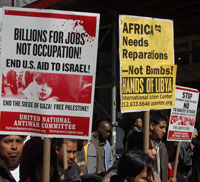 On March 31, U.S.-led NATO assumed overall command of the operation in Libya. The U.S. handed command of the NATO operation to Canadian Lieutenant General Charles Bouchard thereby giving the impression that NATO is quite independent of the U.S. and the U.S. is merely playing a supporting role in the aggression against Libya.
On March 31, U.S.-led NATO assumed overall command of the operation in Libya. The U.S. handed command of the NATO operation to Canadian Lieutenant General Charles Bouchard thereby giving the impression that NATO is quite independent of the U.S. and the U.S. is merely playing a supporting role in the aggression against Libya.
Defense Secretary Robert Gates and Admiral Mike Mullen, the chairman of the Joint Chiefs of Staff, testifying to the Senate Armed Services Committee hours after the handover told Senator John McCain that some of the U.S. AC-130 gunships and A-10 tankbusters will remain available for use by the NATO commander if Qaddafi’s forces threaten the eastern city of Benghazi, the headquarters of the alleged rebellion, McClatchy reports. They said the U.S. would “limit” itself to a supporting role in which American aircraft and ships will jam communications and provide midair refueling, intelligence and other specialized aid to Britain, France and other nations that are assuming leading roles in the operation.
Gates “asserted the rebels needed training more than guns but suggested other nations do that job,” al-Arabiya wrote.
“My view is that the future of Libya — the United States ought not take responsibility for that. I think there are other countries both in the region and our allies in Europe who can participate in the effort,” said Gates, adding, “I just don’t think we need to take on another one.” Gates’ comments were echoed by Mullen, McClatchy reports.
Gates said he was determined to avoid major U.S. military involvement in Libya. “I am preoccupied with avoiding mission creep and avoiding an open-ended, very large scale American commitment in this,” he said. “We are in serious budget trouble.”
Gates declined to address the presence inside Libya of CIA paramilitary teams that U.S. officials say are maintaining contact with the “rebels” and gathering intelligence on Qaddafi ‘s forces and targets for airstrikes.
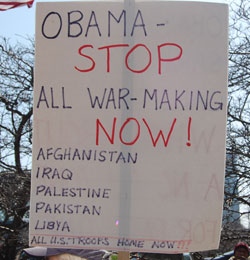 In more recent testimony, top U.S. General Carter Ham told a U.S. Senate hearing that it was unlikely that Libyan rebel forces could oust Libyan leader Muammar Qaddafi, saying the conflict appeared to be turning into a stalemate. The general, who led the first stage of the coalition air campaign in Libya, claimed the international intervention had succeeded in protecting civilians for the most part but that regime change would not come through military means. Asked at the hearing about the chances that the opposition could “fight their way” to Tripoli and replace Qaddafi, Ham said: “I would assess that as a low likelihood.”
In more recent testimony, top U.S. General Carter Ham told a U.S. Senate hearing that it was unlikely that Libyan rebel forces could oust Libyan leader Muammar Qaddafi, saying the conflict appeared to be turning into a stalemate. The general, who led the first stage of the coalition air campaign in Libya, claimed the international intervention had succeeded in protecting civilians for the most part but that regime change would not come through military means. Asked at the hearing about the chances that the opposition could “fight their way” to Tripoli and replace Qaddafi, Ham said: “I would assess that as a low likelihood.”
And when pressed by Senator John McCain whether the situation was essentially a stalemate or an “emerging stalemate,” Ham said: “Senator, I would agree with that at present on the ground.” Under further questioning, he added that a stalemate is “not the preferred solution” in Libya but that outcome appeared “more likely” now than at the outset of the air campaign. This increases the likelihood that a country such as France will try to challenge U.S. domination of North Africa by getting its own boots on the ground to shore up the rebel forces. Senator McCain continues to call for a ground invasion by the U.S.
Reports from other countries indicate the divisions among the various contending power. French Defense Minister Gerard Longuet said providing weapons was not part of the UN mandate, while NATO chief Anders Fogh Rasmussen said, “We are there to protect the Libyan people, not to arm people.”
Russian Foreign Minister Serguei Lavrov at a press conference warned against NATO providing the aid requested by the so-called rebels, because to do so would be “meddling in a civil war.”
“This was not authorized by the UN Security Council,” Lavrov told a press conference. He emphasized that solutions to the ongoing crisis should be dealt with through negotiations insisting that they cannot be imposed by the use of military force. The reports do not say whether Lavrov considered the NATO airstrikes on government forces to be “providing aid,” “meddling in a civil war” or use of military force.
There are reports that Qatar is already providing training and weapons in exchange for the oil they are receiving from the so-called rebels.
Russia’s RT reports that “Protests against NATO actions are becoming a common scene in Benghazi. Many are accusing the alliance of failing to protect civilians. Rebels are not asking for help anymore, they are demanding [to be armed].”
Libyan “Defections”
Global Research writer Gregory Elich sheds light on the so-called defections of Libyan officials, which are cited by some as a sign that the Qaddafi regime is weakening and that the foreign intervention is succeeding. Elich writes:
“The latest defections, by Libyan foreign minister and former intelligence chief Moussa Koussa, and Libyan UN representative Ali Abdessalam Treki, may not have been quite as spontaneous as Western officials would have us think.
“’I don’t believe that [Koussa] necessarily decided on his own,’ observes former CIA officer Emile Nakleh. ‘I judge that intensive behind-the-scenes contacts must have been occurring between him and Western, people from the West, let’s say. I would be appalled, frankly, if our intelligence services and our government had not attempted to contact him and encourage him to leave.’
“And indeed, that was the case, as both U.S. and British intelligence agents were in regular contact with Koussa in the days leading up to his departure from Libya.
“Koussa had a comfortable life in Tripoli. What blandishment would make a man abandon his home and family? He may have been offered money, but at his age, that seems inadequate motivation for adopting a life of being effectively held under house arrest, far from family, and undergoing daily interrogation. It is anticipated that the interrogation sessions are to last from two to three years.
“Although a financial reward may someday come his way, that would depend on Koussa telling his interrogators what they want to hear, even if he has to lie to do so, such as taking on blame for the Lockerbie bombing. Koussa is expected to produce. According to a British official, ‘Absolutely no promises will be made initially. That’s a golden rule because it’s too early to know exactly what his intelligence is worth.’ Debriefing sessions can last as long as six hours at a time. ‘This is all about control. Intelligence staff will make sure he reveals what information they want and when they want it,’ the official pointed out.
“So if no promises were made, how were British and U.S. intelligence officials able to persuade Koussa to leave Libya? They may well have threatened him. The precedent of Yugoslavia is relevant here. In October 2000, a movement led by individuals trained and funded by the CIA overthrew the Yugoslav government. In its place were installed new leaders who immediately set about the task of putting the entire economy at the service of Western capital.
“For more than a year beforehand, U.S. intelligence officials visited several Yugoslav officials, who had been placed on a travel ban by U.S. and Western officials. Removal from the travel ban would be theirs, the Yugoslav officials were told, if they agreed to cooperate in the U.S.-backed campaign to overthrow the government. Some were even warned that they would be charged with war crimes if they refused to collaborate, and might be spirited away and placed on trial before the criminal tribunal at The Hague.
“It is very likely that similar threats were made against Koussa and other defectors. Already, the Chief Prosecutor of the International Criminal Court, Louis Moreno-Ocampo, has announced that investigations into Libyan war crimes are underway, and he hopes to issue the first arrest warrants by May. In addition to Qaddafi and his sons, those said to be under investigation include ‘some people with formal authority who should pay attention to crimes committed by their people.’
“Steven Rapp, U.S. Ambassador-at-large for War Crimes Issues, says that ‘it is not a question of if, it’s a question of when’ Libyan officials will be charged with war crimes.
“More defections can be expected. British agents are currently in touch with ten ‘leading Libyan officials.’ And it can be assumed that CIA agents are active as well.
“What inducements are offered can only be surmised: immunity from prosecution? Or a promise of a light sentence rather than harsh terms?
“Once again, the system of international war crimes justice is seen to serve a political purpose. Indictments against Libyan officials are already promised. There is not a single government on earth that would fail to respond with force to an armed uprising, and it is ludicrous to demand that Libya be the exception. What is taking place in Libya is a civil war, where the West has intervened in that state’s internal affairs on behalf of one of the parties in the conflict. Only those on one side of this civil war are to be charged with crimes. More importantly, NATO and its members states, as they rain down bombs and cruise missiles on Libya, are immune from prosecution.
“In the weeks ahead, as further defections are announced, these will be presented as evidence of the moral rightness of the NATO war. But it would be more accurate to say that what will be shown is the moral bankruptcy of the West’s language of threats.”
(For the full item with footnotes, see: http://www.globalresearch.ca/index.php?context=va&aid=24115)
[TOP]
Egyptians Remain Steadfast in
Demands for Change
 Thousands of Egyptians participated in actions in April in Cairo and other cities demanding the complete dismantling of the old regime, respect for human rights and that former officials accused of corruption be put on trial. On April 8, Friday prayers at public squares gave way to mass protests in a day called “Friday of Judgment and Cleansing,” in reference to holding former President Hosni Bubarak and his henchmen to account and ensuring they are not permitted to be part of the new political arrangements the people are demanding.
Thousands of Egyptians participated in actions in April in Cairo and other cities demanding the complete dismantling of the old regime, respect for human rights and that former officials accused of corruption be put on trial. On April 8, Friday prayers at public squares gave way to mass protests in a day called “Friday of Judgment and Cleansing,” in reference to holding former President Hosni Bubarak and his henchmen to account and ensuring they are not permitted to be part of the new political arrangements the people are demanding.
Tahrir Square was again crowded with people from all walks of life. Hundreds of students marched from Cairo University to Tahrir Square to join the students from private facilities demanding changes in the administrations. Imam Safwat Hagazi, after leading Friday prayers at the square, recalled to those gathered that the military council appointed since Mubarak was deposed has arrested about 5,000 citizens since it took power. All those present reiterated the demands for a real transition that will dismantle Mubarak’s party, the Democratic National party. They also called for the release of political prisoners, including activists who are not expected to be brought to trial anytime soon. Meanwhile, attention was brought to the case of a blogger accused of slandering the troops, which has sparked other protests.
A statement from the Armed Forces Supreme Council (AFSC) that was handed power by Mubarak on his resignation, warned that the military will arrest and try any civilian wearing a military uniform in Tahrir, after some activists urged people to do so as a joke.
On April 9, security forces faced off with Egyptian protesters, who again converged on Tahrir Square to ask for the immediate prosecution of Mubarak and his henchmen, AFP reported. They were met with state violence as riot police fired into the air, the report added.
The angry crowd on Saturday promised to relentlessly pursue their demands, including for social reforms and the prosecution of former regime figures. Activists again demanded the release of political prisoners, the lifting of the 30-year-old state of emergency and the disbanding of the military court.
The emergency law, in place since former Egyptian President Anwar Sadat was assassinated and Mubarak assumed power, allows authorities unfettered power to arrest people without charge and to ban protests.
Mubarak’s Former Ruling Party Dissolved
On April 16, an Egyptian judge ordered the dissolution of the former ruling National Democratic Party (NDP) of ousted President Hosni Mubarak. Its assets will be liquidated and transferred to the government, Prensa Latina reports. The ruling was announced Saturday by Judge Magdy al-Agati, head of the Supreme Administrative Court, in Cairo.
If carried out, the ruling would fulfill one of the demands of the Egyptian people since their protests forced the resignation of Mubarak and who are calling for new political arrangements free from all vestiges of his corrupt U.S.-backed regime. This includes the demand that all those who were NDP members be banned from standing in legislative elections in September.
In related news, agencies also report that top NDP officials, including Mubarak, his son Gamal and businessman Ahmed Ezz, chairman of Ezz Steel, have been arrested and questioned as part of a wider corruption investigation.
Protests are continuing, pressing demands for a civilian government, not the military council Mubarak put in power, an end to the emergency law and freedom to political prisoners.
[TOP]
Yemen Government Continues Violent Repression of Protesters
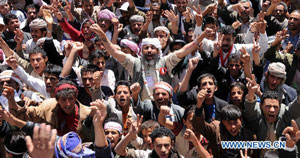 On April 18, Yemeni plainclothes police opened fire on anti-government protesters, which activists said left at least 45 people wounded, news agencies report. Thousands of protesters, demanding the ouster of President Ali Abdullah Saleh, in power since 1978, were attacked by police, armed with bats, pistols and stones.
On April 18, Yemeni plainclothes police opened fire on anti-government protesters, which activists said left at least 45 people wounded, news agencies report. Thousands of protesters, demanding the ouster of President Ali Abdullah Saleh, in power since 1978, were attacked by police, armed with bats, pistols and stones.
The day before, when protestors took to the streets of the capital Sana’a, as well as the western cities of Taez and Dhamar, government forces opened fire, killing at least one person and injuring hundreds of others, agencies report.
At least two people died in mass anti-government protests in the capital on April 5, just about 24 hours after another 17 lost their lives in similar circumstances in the southern city of Taez, where demonstrations continued. Opposition spokespeople said that security forces and plainclothes gunmen opened fire on protesters demanding the resignation of President Ali Abdulah Saleh at a rally in what is known as Change Square, next to the University of Sana’a.
The demonstration brought together university students, members of the army who have joined the opposition, activists of political parties and members of important tribes who rejected a proposal by the president to delay a transition until the end of this year.
According to eyewitnesses, dozens of protesters were wounded in clashes between forces loyal to Saleh and soldiers supporting the opposition near the University of Sana’a. Men positioned at strategic points of the capital opened fire in an action similar to those carried out on Sunday and Monday in Taez and Hudaydah cities, where demonstrations continue against Saleh and his government.
It is reported that the death toll in Yemen has surpassed 300 since anti-government protests began in late January. Despite the violent state repression, the U.S. continues to provide military aid to the Yemen government.
The opposition has reiterated that President Saleh must resign to pave the way for an end to the uprising. “We demand the abdication [of Saleh],” Sultan al-Atwani of the Unionist Nasserist Party told reporters after a meeting between the opposition and ministers of the Gulf Cooperation Council (GCC) member states in the Saudi capital of Riyadh on Sunday, AFP reported.
“We favor the Gulf initiative... but we reject the paragraph in the final communiqué of the April 10 GCC foreign ministers’ meeting proposing a transfer of presidential powers; we demand the abdication [of the president],” he stressed.
On April 10, the GCC member states — Bahrain, Kuwait, Oman, Qatar, Saudi Arabia and the UAE — called on President Saleh to “announce the transfer of his powers” to the Yemeni Vice President Abdrabuh Mansur Hadi.
The GCC states also called for the formation of “a government of national unity led by the opposition” which would be responsible for “establishing a constitution and organizing elections.”
They said that the six-member council would hold further talks with Saleh’s representatives in the Yemeni capital of Sana’a, but did not specify a date for the next meeting.
Yasin Saeed Numan, head of the opposition coalition, also described the third and the latest round of talks as “fruitful.”
Although the talks do not seem to have triggered a major breakthrough in Yemen, the opposition has agreed to continue them, Press TV reports.
[TOP]
Massive Protest Against U.S. Drone Strikes
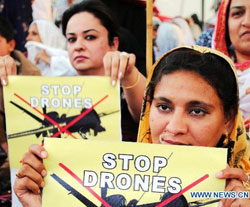 From April 23-24, thousands of people demonstrated in the northwest of Pakistan to demand an end to U.S. drone strikes in Pakistan's tribal regions, news agencies report. Protestors spent Saturday night and all day Sunday blocking the Khyber Pass, NATO's main supply route for its war on Afghanistan, preventing the transit of supply trucks and oil tankers. It is reported that nearly 70 percent of NATO supplies are transported through Pakistan.
From April 23-24, thousands of people demonstrated in the northwest of Pakistan to demand an end to U.S. drone strikes in Pakistan's tribal regions, news agencies report. Protestors spent Saturday night and all day Sunday blocking the Khyber Pass, NATO's main supply route for its war on Afghanistan, preventing the transit of supply trucks and oil tankers. It is reported that nearly 70 percent of NATO supplies are transported through Pakistan.
The CIA has justified its crimes against the people of the region by portraying the people's resistance to imperialist aggression and foreign occupation as terrorist activities.
Asad Qaisar, a senior leader of Tehrik-e-Insaf (Justice Movement) which called the demonstration said people from other areas started coming to join the protest Sunday morning. Political leaders of other parties also joined the protest to show unity.
Imran Khan, head of Tehrik-e-Insaf told thousands of people on the first day of protest in Peshawar, capital of Khyber Pakhtunkhwa, that more protest rallies would be planned in the coming days unless the CIA stops drone strikes. "The government has failed to stop the U.S. strikes which kill innocent people including women and children," he said. The plans to disrupt supplies to NATO forces if the U.S. does not halt drone strikes in a month time were reiterated by Khan on the following day.
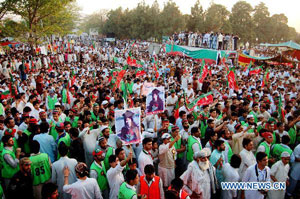 A drone strike in March killed more than 40 tribesmen who had gathered in Datta Khel area of North Waziristan to resolve a local dispute. Army chief General Ashfaq Parvez Kayani had angrily reacted to that strike and the tribesmen vowed revenge.
A drone strike in March killed more than 40 tribesmen who had gathered in Datta Khel area of North Waziristan to resolve a local dispute. Army chief General Ashfaq Parvez Kayani had angrily reacted to that strike and the tribesmen vowed revenge.
Despite the growing public anger and Pakistan's official protest, the U.S. administration has rejected any possibility of halting the strikes, agencies report.
[TOP]
U.S. Condemned for Support of Violent State Repression in Bahrain
Bahraini human rights activist Zainab al-Khawaja has criticized the U.S. administration for turning a blind eye to the Saudi-backed crackdown on anti-government protesters in Bahrain.
“On the one hand, the American administration always tries to show the world they represent democracy, but on the other hand they’re giving the green light to the Bahraini dictatorship to do whatever they want to the Bahraini people and that is very, very, shameful,” al-Khawaja told Press TV from Manama on April 18.
“Freedom and human rights and justice are not just words. You cannot claim to be behind change and freedom and then in Bahrain support dictators with all you have and stay silent over all of human rights abuses,” she added.
On April 17, al-Khawaja was taken to hospital after seven days of hunger strike following the violent arrests of her father, uncle, husband and brothers-in-law by government forces. Her father, Abdulhadi al-Khawaja, is a prominent Bahraini opposition figure. Family members and human rights activists said that masked -officers burst into al-Khawaja’s home on April 9 and assaulted her father and husband.
Following al-Khawaja’s example, protesters are preparing to start the world’s largest joint hunger strike to show their anger with the regime’s crackdown on peaceful demonstrators.
The organizers called on all Bahrainis around the world to begin a hunger strike Monday, April 18 in protest against the regime’s brutalities against the opposition.
Most recently, government security forces have reportedly arrested several teachers and students in the town of Hamad.
As well, hundreds of civil servants from the Education Ministry have also been detained and prosecuted for taking part in the anti-regime protests, agencies report.
People in Bahrain have been protesting since February 14. Protestors are demanding an end to the rule of the Al Khalifa dynasty, new political arrangements that empower them and an end to subservience to U.S. interests. Demonstrators maintain that they will hold their ground until their demands are met, agencies report.
[TOP]
